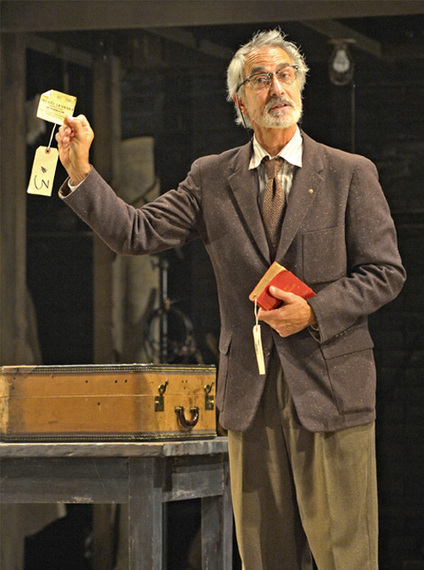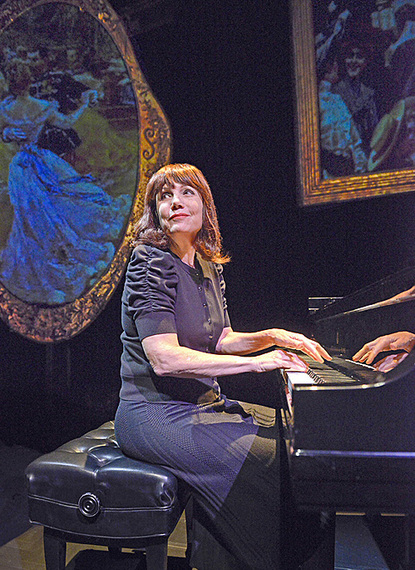Two plays, two consecutive nights, two explorations of Jewish experience, two virtuoso performances in which one actor fills many roles: Together they offer proof that the art of storytelling is not only alive but very healthy in the age of Apple, Android and Netflix.
The first was Glen Berger's Underneath the Lintel, in an ACT production at the Geary Theater, showcasing the masterful David Strathairn in an obsessive search through two millennia of myth and mystery.
One day later, pianist-turned-actress Mona Golabek placed the focus on eight harrowing years in the life of her own mother in The Pianist of Willesden Lane in Berkeley Rep's Thrust Theater.
Both brought down the house, won sustained standing ovations and left indelible impressions.
That's where the similarities end. Underneath the Lintel borders on fantasy; Pianist of Willesden Lane simmers with personal truth, anguish and joy.
Underneath the Lintel
Strathairn's searcher is a fussy, nervous Dutch librarian who spends his working days checking in books that have been dropped into the overnight depository. He marks each return with the date, using a stamper that can be adjusted to every day in history, a fact that he notes with delight. And he seems to revel in the discovery of overdue volumes, whose borrowers would then be notified and fined.
But he stops short in amazement when he opens a battered travel guide that had been checked out in 1873, 113 years earlier. As a curious and conscientious bureaucrat,
this librarian plunges into the institution's encyclopedic records to trace the miscreant who would perpetrate such a deed, and finds an answer. The borrower had given his name as the single letter "A" and his address as a post office box in China.
A mystery, to be sure. Improbable. Goofy. But that's just the beginning of an adventure that navigates through time, geography and metaphysical realms.
The event that transforms the librarian's life comes when the overdue book disgorges a receipt for a pair of trousers from a laundry in London. Its date is 1913. London is just a few hours away, so visiting there is easy. The inquisitive jaunt launches an unending quest.
Playwright Berger fills that quest with all manner of erudition and trivia, described or enacted with crispness, wit and tension by Strathairn. Through travels that take the librarian to England, China, Poland, New York, Australia and most importantly to the ancient Middle East, details emerge about matters as diverse as fox hunting, botany, lost loves, religious interpretation and the human need to explore.
None of the details is more crucial than the pronouncement, reputedly hurled by Jesus at a cobbler who refused to let him rest on his doorstep during the climb to Golgotha: "I will go ... but you will tarry til I come again."
From those words, or a multitude of variants that have surfaced over centuries, come the myth of the Wandering Jew, a shadowy figure condemned to travel without a moment's rest through all of time. For Berger's librarian, who enters as a narrator and ultimately comes to embody the endless wanderer, that insatiable quest is as elemental as life itself.
Under Carey Perloff's direction, Strathairn fills the role with an unflagging air of timidity, wonder and determination. A superb performance in a tour-de-force for both the actor and the playwright.
The Pianist of Willesden Lane
How many of us have heard of the Kindertransport? Very few, I imagine. It was a humanitarian program that brought some 10,000 children -- mostly Jewish -- from Germany, Austria, Poland and elsewhere in Europe to Britain on the eve of World War II.
Lisa Jura, the mother of pianist-author-playwright-actress Mona Golabek, was one of those children. In The Pianist of Willesden Lane, Golabek recounts her story in both words and in music that her mother loved and played: music that saved her life.
Performing on a set that holds only a Steinway grand piano and four ornate picture frames, which serve as projection screens, Golabek steps to the center of the stage, introduces herself and tells of her mother with directness and simplicity, then proceeds to assume her mother's identity.
Her narrative goes beyond poignancy, encompassing shock, horror, courage and persistence in the face of brutal events; her music, ranging from the tenderness of Debussy's Clair de Lune to the thunder of Grieg's Piano Concerto in A Minor, reinforces the dramatic chronicle.
The play was drawn from the Golabek's memoir The Children of Willesden Lane, jointly written with Lee Cohen. It was adapted for the stage by Golabek and Hershey Felder, a veteran at creating, performing and directing one-person shows that blend words and music.
In 90 minutes that seem far too short, Golabek spans the years from 1938, when her mother was a 14-year-old piano prodigy in Vienna, through 1945, when she made her professional debut in London. If the play has any significant flaw, it is the dearth of details about Lisa's interplay with the youngsters with whom she shared life in a shelter during the war years. (They're in the book, which reads simply and poignantly.)
Grainy black-and-white projections -- photos and newsreel footage of Nazi atrocities -- set the background for her departure from Vienna, made especially painful because the family received only one ticket for the Kindertransport, forcing her parents to choose among three daughters. Lisa's musical talent and the family's belief in her future as an artist was the deciding factor.
Golabek skims over the journey by train and ship, carrying Lisa first to a rural British home where she worked as a nursemaid and later to the shelter, where she found companionship and the one object that she coveted most: a piano.
The instrument was available for play only at night, after she has finished work in a clothing factory. Unless bombs were falling. But she practiced intensely, earned respect from friends and demanding teachers alike, and ultimately triumphed in her own eyes and the music world's. Against the background of the Holocaust, it's a conclusion worthy of cheers and tears. Golabek earned both.
Acting came relatively late to Golabek, who has been an international concert performer, host of a radio show that mixes music and words, and organizer of a foundation dedicated to promoting music. She's apparently a quick learner. Pianist of Willesden Lane is obviously close to her heart, undoubtedly mixing pain with pride as she presents it over and over again, but she delivers every nuance with the polish of an old pro.
It's a dazzling dramatic achievement, blended into a superb concert.
Underneath The Lintel runs through Nov. 23 in ACT's Geary Theater, 415 Geary St., San Francisco. Tickets cost $20-$110, from 415-749-2228 or act-sf.org.
The Pianist of Willesden Lane runs through Jan. 5 in Berkeley Repertory Theatre's Thrust Theatre, 2015 Addison Street, Berkeley. Tickets cost $29-$89, from 510-647-2949 or berkeleyrep.org.
--

